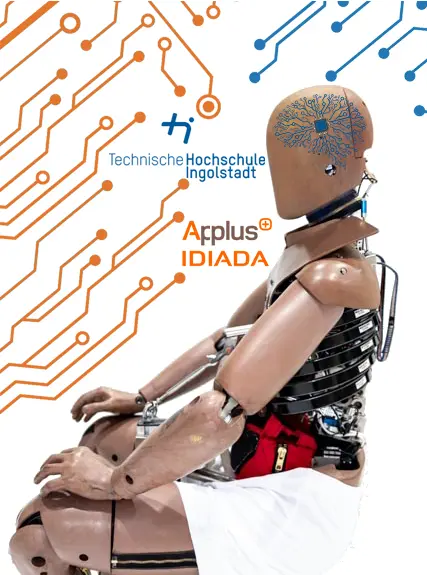arTIco is a research project in the funding line "Digitalization" of the Bavarian Cooperative Research Programme (BayVFP) of the Free State of Bavaria. The acronym arTIco stands for "Artificial Intelligence and Correlations: Methodology for correlating digital twins in vehicle safety based on artificial intelligence". The partners are Applus+ IDIADA Fahrzeugtechnik GmbH and the CARISSMA Institute of Safety in Future Mobility (C-ISAFE) at Ingolstadt University of Technology.
The two-year project started in January 2022 to explore methods for validating digital twins. The proposed approaches build on artificial intelligence, intending to enable a much broader assessment of model validity than current methods.
The application example of crash test dummies for passive vehicle safety should demonstrate the methodology's performance. The focus is on the evaluation and further development of previously used correlation factors. The new approaches are intended to enhance the established ones with expert knowledge, make them more objective, and be established in the future as an alternative to current certification procedures.
The arTIco project investigates an innovative approach to the objective assessment of validation and certification quality using artificial intelligence. Expert knowledge is conserved and used to expand the existing process. This provides a foundation for assessing vehicle safety through virtual crash simulations that surpasses the current state of the art. The validation, calibration, and certification of virtual models are usually based on individual comparisons. For example, a corridor is specified for the data collected by a particular sensor. For the model to be valid, the data must be within this corridor. However, by using only a few sensors and criteria, the actual physics is only considered to a limited extent. This leads to limited usability of the virtual models and to a reduction of confidence in them. A broader database within the validation should significantly increase the model quality. Ultimately, increased confidence in the model quality should lead to crash simulations increasingly replacing expensive hardware tests.






![[Translate to English:] Logo Akkreditierungsrat: Systemakkreditiert](/fileadmin/_processed_/2/8/csm_AR-Siegel_Systemakkreditierung_bc4ea3377d.webp)








![[Translate to English:] Logo IHK Ausbildungsbetrieb 2023](/fileadmin/_processed_/6/0/csm_IHK_Ausbildungsbetrieb_digital_2023_6850f47537.webp)


